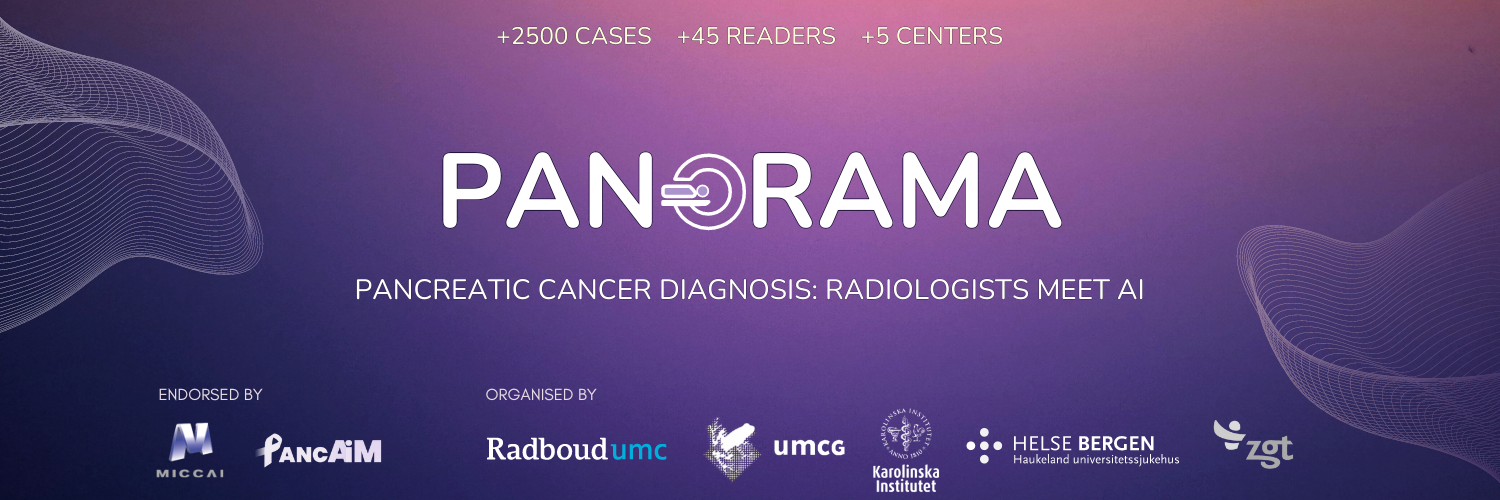📢 28 February 2025: The PANORAMA challenge final testing results are publicly available and were presented at the European Congress of Radiology in Vienna, Austria.¶
📜 If you are using any of the resources (e.g., dataset, source code repositories, AI models, benchmarks, outcomes) associated with the PANORAMA challenge, please cite the following article as reference: Alves, N., Schuurmans, M., Rutkowski, D., Yakar, D., Haldorsen, I., Liedenbaum, M., Molven, A., Vendittelli, P., Litjens, G., Hermans, J., & Huisman, H. (2024). The PANORAMA Study Protocol: Pancreatic Cancer Diagnosis - Radiologists Meet AI. Zenodo. https://doi.org/10.5281/zenodo.10599559¶
Clinical problem 🔍¶
Pancreatic cancer is estimated to become the second leading cause of cancer-related deaths in Western countries by 2030. Pancreatic ductal adenocarcinoma (PDAC), the most common and aggressive type of pancreatic cancer, cannot be effectively prevented or screened for and is associated with 98% life expectancy loss. Due to the lack of early, disease-specific symptoms, 80–85% of patients are diagnosed in advanced disease stages. However, patients at stage I present a significantly more favorable prognosis than stage IV patients (median survival: 26 vs. 4.8 months), making early detection the current most effective approach to improving outcomes (Schwartz et al., 2021).¶
Abdominal contrast-enhanced computed tomography (CECT) scans are usually the first line of diagnosis for PDAC, as there are no validated early diagnostic biomarkers. Studies have shown that in 16%-84% of cases, cancer signs (such as pancreatic duct cutoff/dilatation and pancreatic atrophy) can be retrospectively seen on CECT scans 3–36 months before clinical diagnosis (Singh et al., 2020; Toshima et al., 2021). These secondary signs and subtle focal lesions can be overlooked in clinical practice, where most abdominal CECT scans are acquired for non-pancreatic-specific indications, leading to delayed diagnosis and reduced survival.¶
Need for Larger Datasets and Adequate Benchmarks 📈¶
Modern artificial intelligence (AI) algorithms have paved the way for powerful computer-aided detection and diagnosis (CAD) systems that rival human performance in medical image analysis (Esteva et al., 2017, McKinney et al., 2020, Cao et al. 2023). Clinical trials are the gold standard for assessing new medications and interventions in a controlled and comparative manner, and the equivalent for developing AI algorithms are international competitions or “grand challenges”. Grand challenges can address the lack of trust, scientific evidence, and adequate validation among AI solutions (Leeuwen et al., 2021) by providing the means to compare algorithms against each other in a bias-free manner, using common training and testing data. PANORAMA is the first-ever AI Grand Challenge for PDAC detection and will introduce the largest publicly available data set for this task to date.¶
The PANORAMA Challenge and Reader Study👩💻🧑⚕️¶
The PANORAMA (Pancreatic cancer diagnosis: Radiologists meet AI) study is a new prospectively designed multi-center study with over 1500 cases, established in conjunction with an international, multi-disciplinary scientific advisory board (11 experts in pancreas radiology, AI, and pancreatic cancer survivor representative) —to unify and standardize present-day guidelines and to ensure meaningful validation of pancreas-AI towards clinical translation (Reinke et al., 2022).¶
Within the PANORAMA study, we will host the first international reader study and AI grand challenge for PDAC detection on CECT, where we will assess radiologists and AI algorithms from all over the world using a standardized and controlled environment.¶
The PANORAMA study primarily consists of two sub-studies:¶
- AI study: An annotated data set consisting of retrospective, multi-center, cancer-enriched routine upper-abdominal CECT scans is made publicly available for all participating teams and the research community at large. The data set aims to represent clinical reality by including PDAC and non-PDAC patients (both healthy pancreas patients and patients with non-PDAC pancreatic lesions). Teams can use this dataset to develop AI models and submit their trained algorithms (in Docker containers) for evaluation. At the end of this open development phase, all algorithms are ranked based on their performance on a hidden testing cohort of 400 unseen scans.
- Reader study: The PANORAMA reader study will include around 400 cases from multiple institutions that will be read by a panel of 40+ international readers with varying levels of expertise.
Ultimately, PANORAMA aims to benchmark state-of-the-art AI algorithms developed in the grand challenge against abdominal radiologists participating in the reader study —to evaluate the clinical viability of modern pancreas-AI solutions at PDAC detection and diagnosis in CECT.¶
Prizes 🏆¶
Top 5 pancreas-AI teams will be invited to join the PANORAMA consortium, and in turn, they will be listed as consortium authors on an upcoming high-impact journal paper summarizing the findings of this challenge. Furthermore, they will receive the following cash prizes, as per their ranking:
🥇1st place: €1000
🥈2nd place: €500
🥉3rd place: €250
⭐4th place: €150
⭐5th place: €100

